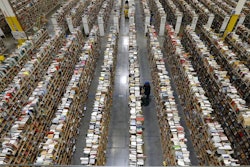
CARSON CITY, Nev. (AP) — Nevada lawmakers are fixing flaws in bills that will authorize $335 million in incentives for electric carmaker Faraday Future, but procedural delays means there was still plenty to do even as night approached on Friday.
The Legislature started its main meetings hours late during the third day of its special session, as lawmakers, lobbyists and state officials worked to reach agreements on water rights and who's responsible for paying back bonds if Faraday flops. When they finally met, they worked to amend two bills that allow for tax breaks, a new workforce training program and infrastructure investments in the company's proposed home in North Las Vegas.
The touchy water rights issues that were delaying the process were removed from one of the bills and are expected to be addressed in at least one additional bill, which hadn't yet been introduced by Friday evening.
Some lawmakers raised concerns over part of a Senate bill that would expedite the process of allocating water rights when a major economic development project is on the line. Republican Assemblyman Jim Wheeler said the language gives the state water engineer too much power, and said it isn't appropriate to make a potentially far-reaching change to water law during a brief special session.
There was also debate about which government agency would provide water service to the Apex Industrial Park.
Assembly members spent their day working on a bill to revamp Nevada's workforce development programs, which state officials say need improvement to keep Nevada workers competitive. The bill would create the Workforce Innovations for a New Nevada (WINN) program and apply $2.5 million to the account through transfers from Nevada's general fund and the state Office of Science, Innovation and Technology.
State officials would meet with major new businesses moving to Nevada and work with them to develop a customized training program, according to Dale Erquiaga, chief strategy officer for Gov. Brian Sandoval. The WINN account would provide startup money so colleges or other agencies can develop the training, which is modeled after initiatives in Georgia and Louisiana.
The session, initiated by Gov. Brian Sandoval, began Wednesday evening and was expected to wrap up within a few days. It's called special because the Legislature typically only meets for four months every other spring.
Sandoval wants lawmakers to approve a new category of tax abatements that would authorize $215 million in tax credits and abatements for the Chinese-backed automaker, which hopes to break ground on a 3 million-square-foot facility in North Las Vegas.
He's also asking legislators to tweak laws that allow financing for infrastructure projects. Nevada officials want to publicly finance $120 million in water, rail and road improvements at the Apex Industrial Park in North Las Vegas.
Faraday Future, based in Gardena, California, has offered few details about its product, but plans to unveil a concept car ahead of the Consumer Electronics Show in Las Vegas in January. It hopes to bring a vehicle to market as early as 2017, and plans to employ 4,500 people at its plant.
The venture is backed by Jia Yueting, an online video and gadget entrepreneur and founder and CEO of Beijing-based holding company LeTV. He styles himself after Apple's late Steve Jobs.
The agreement is projected to bring state and local governments $760 million in tax revenue — three times the amount of tax abatements and credits the state plans to offer the company.






















